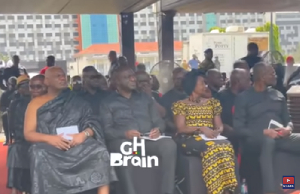General News of Tuesday, 18 May 1999
Source: null
Commission on human rights calls for cultural review
Accra (Greater Accra) 18 May ?99
The Commission on Human Rights and Administrative Justice (CHRAJ) on Monday said there is an urgent need for "a critical cultural review" in the light of the controversy generated by the ban on drumming by the Ga Traditional Council.
It said in a statement in Accra that this is "in order to harmonize our cultural practices with human rights values and norms".
CHRAJ, therefore, called on the National Commission for Civic Education, National Commission on Culture, National House of Chiefs, Traditional Councils and District Assemblies "to embark on a carefully programmed process of cultural review."
In a six-page reaction to its earlier statement that the ban violates the constitution, CHRAJ said it is unfortunate that some people would want to construe it to mean it has arrogated to itself the function of the Supreme Court.
It said it believes in upholding the cultural integrity and validity of the various ethnic groups. However, Article 1 (2) of the constitution states that "This constitution shall be the supreme law of Ghana and any other law found to
be inconsistent with any provision of this constitution shall, to the extent of the inconsistency, be void."
Thus, it said, the constitution takes precedence over every customary law or practice, and the legal validity of any cultural practice must be measured or assessed in relation to the constitution.
CHRAJ said the constitution upholds customary law and customary or cultural practices as integral parts of the laws of the country. However, the totality of Article 26 (1) and (2) of the constitution means that the various customary laws and cultural practices are valid only within the confines of the constitution.
Article 26 (1) says, "Every person is entitled to enjoy, practise, profess, maintain and promote any culture, language, tradition or religion subject to the provisions of this Constitution."
Article 26(2) states that "All customary practices, which dehumanize or are injurious to the physical and mental well-being of a person are prohibited."
CHRAJ said while upholding the right of each ethnic group to practise and maintain its culture, the practice must conform to the Constitution.
"Flowing from this, the Gas have the constitutional right to practise and maintain their culture and religion, including a ban on noise making during a particular period of the year to be observed by those who embrace that cultural practice.
"However, they do not have the right to extend this religious or cultural requirement to others."
CHRAJ said the unconstitutionality of the ban lies in the attempt to require or compel others to forgo their constitutional right to manifest a different religious practice in order that the Gas can practise their culture and religion.
It said forcibly entering churches, beating up people who are exercising their fundamental right to freedom of worship, seizing or destroying the property or others because they have not complied with a unilateral limitation on their worship "is a wanton act of lawlessness".
This, it said, has the potential to result in anarchy if not checked.
It said there are bye-laws regulating noise-making, adding that the manner in which some churches exercise the right to freedom of worship, especially in residential neighbourhoods, may, in certain circumstances, violate the rights of people in the neighbourhood to their peace and quiet.
"Such unlawful infractions must be condemned and dealt with in accordance with the law.
"Furthermore, even though the ban may be a time-honoured tradition, it is necessary to consider its place in the context of a changing Ghanaian society."
It cited the announcement of the death of two important chiefs in the media - the Asantehene and Okyenhene - even beyond a day, and said this is a typical example of the impossibility of maintaining in the same form time-honoured traditions in this modern electronic age.
CHRAJ said it believes that various cultures contain numerous positive elements that must be maintained.
"Our respect for, and deference toward elderly, as the supportive mechanism of the extended family system, are clearly positive."
It said it has spoken out against the infiltration of Ghanaian culture and values by what is shown on TV, especially foreign films, which depict permissive sex and violent crime.
"Nonetheless, like every human society, our cultures in Ghana also contain many negative aspects which must be urgently reviewed through education and legislation."
The Commission said it is its view that the Ga Traditional Council should merely appeal to residents of the traditional area to observe the ban rather than seek to compel compliance.
"Such an approach will win the confidence and sympathy of many who do not subscribe to this cultural practice.
"No group of Ghanaians, whether Moslem, Christians, traditionalists, other religious or ethnic groups, have the right to impose cultural practices on others."










